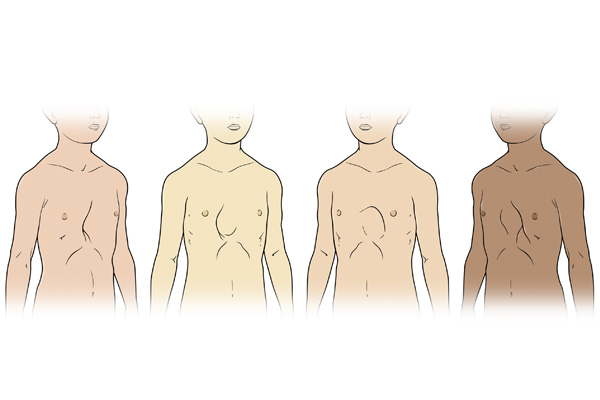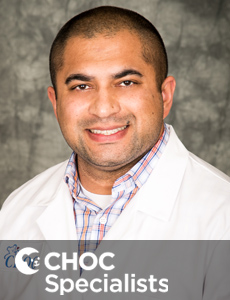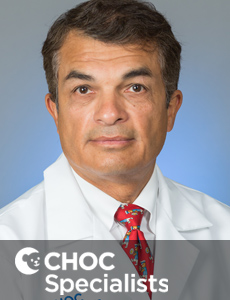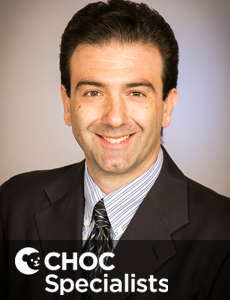Pectus Treatment Program
As a leading provider for pectus care, our treatment program for pectus excavatum and pectus carinatum provides your child with the best possible outcomes. Our experienced pediatric chest wall experts use leading-edge pectus procedures focused on reducing recovery time. That way, your child will be back to doing what they love as soon as possible.
Chest Wall Conditions We Treat
Our pectus treatment program provides care for two chest wall conditions:
- Pectus excavatum is commonly known as “funnel chest.” This occurs when a person’s breastbone is sunken inward, leaving a dent in their chest. The sunken breastbone can be seen shortly after birth or more commonly around puberty. This condition will typically worsen as your child grows. Children with funnel chest can experience symptoms like shortness of breath, heart palpitations, chest wall pain, dizziness and more. More severe cases may interfere with the function of the heart. Severe cases often require corrective surgery.
- Pectus carinatum is also referred to as “pigeon chest.” It occurs when a child’s breastbone and ribs protrude outward. At times, the condition is not identified until after a growth spurt. It typically does not cause complications beyond the chest bulge. However, it can sometimes lead to chest discomfort. Most children will only require a brace to correct pectus carinatum.

Innovative Pectus Treatment Program at CHOC
CHOC’s pectus excavatum program brings together a multidisciplinary team of pediatric experts. Your child’s pectus treatment team includes pediatric pulmonologists, cardiologists, pediatric anesthesiologists, pediatric thoracic surgeons and patient mentors. Our program sets the standard in treatment safety and efficacy by assigning two surgeons to every case. Additionally, our cutting-edge pectus excavatum surgery, the Nuss Procedure, allows around 65% of patients to be discharged from the hospital the same day as their surgery. Our specialized focus on pain management during and after pectus surgery gets kids and teens back to enjoying their childhood as quickly as possible.
Leader in Pectus Excavatum Surgical Treatment
Dr. Mustafa Kabeer, a pediatric general surgeon at CHOC, is one of the few surgeons in the region who performs the Nuss Procedure. He is at the forefront of developing innovative ways to treat patients with pectus excavatum. Dr. Kabeer combines advanced surgical techniques along with a paravertebral block and cryoablation, to significantly reduce pain after pectus surgery. This improved pain management allows for quicker discharge and a minimal recovery at home.
Coordinated Pectus Patient Care at CHOC
Going through a surgical procedure can be overwhelming. That is why CHOC programs are dedicated to supporting families every step of the way. Our pectus program coordinator, Jacqueline Hurley, will guide families and pectus patients through the treatment process. She helps arrange all medical care, travel plans, appointments and more – she is a complete resource. Thanks to Jacqueline, families at CHOC’s Pectus Treatment Program receive unmatched individualized care. Meet Jackie.
Pectus Family Mentorship Program
To further support patient care, CHOC offers a pectus family mentorship program. The program connects past pectus patients with new patients to assist families through the process. The mentorship program is offered to all patients regardless of surgery status.
Planning Your Visit: Pectus Resources for Parents
CHOC can be a destination hospital for families across the country. In addition to the expert team and services for pectus treatment, we offer family amenities and resources to make your trip comfortable. If you are traveling from out of town and need support in planning your visit, the Pectus Treatment Program team is here to help. Check out what CHOC offers for your stay.
Pectus Excavatum and Pectus Carinatum Related Stories
Pectus Treatment Program: What to Expect
Here is the journey you and your child can expect for pectus treatment at CHOC.
- You will start with a consultation from one of CHOC’s three pectus surgeons. A child’s pediatrician typically refers patients. In this consultation, the surgeon will assess your child’s pectus condition and determine if pectus surgery is necessary. If your child is diagnosed with pectus carinatum, they will be referred to orthotics (Pectus Jo) for chest bracing.
- If your child is diagnosed with pectus excavatum and qualifies for surgery, they will undergo pre-operative testing. These tests can include:
-
- Pulmonology Testing
- EKG/ECG
- Echocardiogram
- MRI
- CPX (Cardiopulmonary Exercise Testing)
- After testing, you will have another appointment with your child’s treatment team to review the results. After this review, your family will decide whether to proceed with pectus excavatum surgery.
- If pectus surgery is chosen, Jacqueline, our pectus program coordinator, will work with your family to schedule the procedure and the necessary steps. In most cases, surgery is not an emergency, so timelines can accommodate what is best for your family.
- Finally, your child will undergo their Nuss procedure, where 65% of patients are sent home the same day for recovery.
- You will receive an at-home exercise guide for patients after surgery. However, if additional outpatient rehabilitation services are required, your child will be referred to CHOC’s program or to one closer to your home, if traveling from out of state.
Multidisciplinary Team of Pectus Experts
Your child’s pectus treatment team can include:
- Cardiologists: Perform tests to examine heart function and delivery.
- Pulmonologists: Conduct pre-operative tests for respiratory system function.
- Radiologists: Analyze results of tests like MRIs and CT scans for further function analysis.
- Surgeons: Perform surgery to fix the pectus condition, if needed.
- Pain management specialists: Monitor pain after surgery. Identify specific medications for effective pain management.
The various pediatric experts at CHOC will work together to develop an individualized treatment plan for your child. Through our program, your child will be provided with the exact care they need at the right time.
Expansive Network of Pediatric Specialists in Pectus Treatment
Connective tissue disorders are commonly diagnosed in children with pectus excavatum. If your child needs treatment for a co-occurring condition, Jacqueline, our pectus program coordinator, will help set up any other consultations. If your child has a connective tissue disorder, they will be referred to CHOC’s genetic services.
Request a consultation with our pectus team
While not all pectus cases require surgery, CHOC is here to evaluate on a case-by-case basis. If you are not sure whether your child needs specialty care, it is best to be seen by a pectus treatment expert.
Submit a form to request a consultation with a CHOC pectus expert.
Videos

Adalie developed a depression in her chest, and she began experiencing chest pain and shortness of breath that limited her dancing abilities.

CHOC pediatric surgeon Dr. Mustafa Kabeer explains in this video what pectus excavatum is and how it is treated.
The Pectus Treatment Program Team
Meet our team of physicians and NPs who are experts in pectus treatment, as well as our pectus coordinator, Jacqueline Hurley.

Kabeer, Mustafa H. MD
Specialty:
Pediatric Surgery
Appointments: 714-364-4050
Office: 714-364-4050
Dr. Mustafa Kabeer is a board-certified pediatric surgeon at CHOC, performing all types of general surgery and specializing in pectus excavatum (sunken chest), lung resection, hernia and robotic surgery.

Goodman, Laura F. MD
Specialties:
Pediatric Surgery, Thoracic Surgery
Office: 714-364-4050
Dr. Goodman is a pediatric general and thoracic surgeon who performs surgery on infants and children at CHOC Hospital in Orange

Kim, Joseph K. MD
Specialty:
Anesthesiology
Appointments: 714-560-1580
Dr. Kim is a board certified anesthesiologist who provides care for infants and children undergoing anesthesia at CHOC Hospital in Orange.

Kamath, Sunil P. MD
Specialty:
Pulmonology
Appointments: 888-770-2462
Office: 714-509-8622
Dr. Kamath is the Medical Director of Respiratory, Pulmonary and Blood Gas Services.

Reyna, Troy M. MD
Specialty:
Pediatric Surgery
Appointments: 714-364-4050
Dr. Troy Reyna is a board-certified pediatric surgeon at CHOC, specializing in pectus excavatum, hernias and hyperhidrosis.

Renella, Pierangelo MD
Specialty:
Cardiology
Appointments: 888-770-2462
Office: 714-509-3939
Dr. Pierangelo Renella is board certified pediatric cardiologist who treats kids with heart problems. He has privileges at CHOC Hospital.












